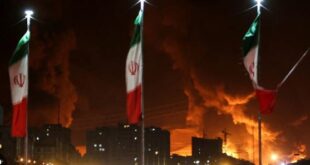Israel-China Relations on an Upswing
Economic ties between China and Israel have increased considerably in recent years. In addition Israel has also been working hard to strengthen political and cultural interaction between the two nations.
In its 72 years of existence, Israel has been a nation with few friends except for the US. Thus, its diplomatic outreach with different countries have been considered one of Israel’s greatest political triumphs.
This diplomatic outreach has befriended nations like India; which is now Israel’s largest defence customer, Gulf nations like the UAE and Bahrain are the recent addition. But the most important ally which it has found is China.
China views Israel as a conduit for increasing regional influence
China views Israel as an important link in its larger design to extend its hegemonic influence through its Belt and Road Initiative (BRI) to control trade from the Far East to Europe. The BRI is a multi-billion-dollar strategy to bring nations in Asia, the Middle East, and Africa under the Chinese influence through economic development by gaining leverage by gifting these nations with non-repayable debt. Beijing’s goal is to use that leverage to manipulate other nations’ foreign policy in its favor while gaining access to intelligence where there are military relations with the US.
The overtures between the two are not just confined to economic or defence relations but extends even to people-to-people or seocietal links, which ultimately culminates in political intimacy.
Avid China-watcher, James M. Dorsey, senior fellow at the S. Rajaratnam School of International Studies at Singapore’s Nanyang Technological University, is of the view that China’s international ventures are aimed at China dominating the Eastern Mediterranean with six ports in four countries, Israel, Greece, Lebanon, and Syria that would create an alternative to the Suez Canal. All that is missing are Turkish, Cypriot and Egyptian ports. Additionally, the Chinese military build-up threatens to complicate US and NATO’s ability to manoeuvre in the region. The Trump administration has already warned Israel that Chinese involvement in Haifa could jeopardise continued use of the port by the US fifth fleet.
China covets improving relations with Israel due to its political interests. Israel is a top priority in China’s Middle Eastern policy. China, which has established good relations with Arab countries and Iran for many years, has diversified its Middle Eastern policies by making Israel an important station of the Maritime Silk Road Project. This high level of interaction has brought cultural and academic partnerships. Israel has also increased its investments in China, which it rarely does.
China’s strategic interest is based on the fact that Israel is one of the world’s foremost commercial, food and security technology powerhouses and it enjoys significant grassroots support in the United States.
The bilateral trade between the two has increased fourfold in the last ten years, and China has become Israel’s third largest trade partner with $14 billion bilateral trade per year.
US view of Sino-Israel relations
The US views these ties as a potential threat as it feels that this proximity will allow China to spy through Israel on US interests.
The importance America places on Israeli-Chinese ties was highlighted by a trip by US Secretary of State Mike Pompeo to Israel during the pandemic for the express purpose of directly sharing the administration’s profound concern for Chinese entanglement in Israel’s infrastructure, and research and development across many cutting-edge fields, coupled with a warning to Israel that America might need to rethink its security relationship if Israel doesn’t disengage from some of this activity.
American concerns with Israel include the Chinese operational control of the Haifa seaport by the Shanghai International Port Group for 25 years, where the US Mediterranean Sixth Fleet docks that some view as a direct threat to American security and intelligence gathering. America is worried that this port can become one of the stepping stones of China’s new “Silk Road” (One Belt One Road, or Belt and Road Initiative) program linking over 60 nations.
The most recent Israeli-Chinese commercial transaction under the microscope is the possible deal with a Hong Kong-based Chinese controlled company to build the world’s largest desalination plant (Sorek 2) at an Israeli kibbutz. Another bone of contention is China’s Railway Tunnel Group that is close to finalizing a deal for Tel Aviv’s light rail transportation system; this too may be seen to have major security implications. China’s first infrastructure project in Israel was the Carmel Tunnels, also an American concern. The American fear is that China could gain unprecedented intelligence with the help of intelligence operatives implanted within Chinese companies, undermining both Israeli and American security interests.
If there is one thing Israel cannot afford, it is a rupture in its bonds to the United States. That is no truer than at a time in which the United States is the only power supportive of Israeli annexation plans on the West Bank.
It’s time for Israel to step back from the economically tempting involvements with China. Washington also needs Israel for its deep-water port in Haifa, its unrivaled intelligence, Israel’s R&D that advance American weapons systems and cyber capabilities, and joint operations and training of US troops in Israel. It’s not permissible for these activities to be spoiled by Chinese entrenchment into Israel’s infrastructure.
America is also worried about joint research and Chinese investment with Israeli technology companies that use cyber security, AI (Artificial Intelligence), and satellite telecommunications that could be used by Chinese companies like ZTE and Huawei. The question is whether Israel can develop a formula that convinces the United States that US interests will delineate Israeli dealings with China and reassure China that it can still benefit from Israeli assets within those boundaries.
“Right now, without taking the right steps, we are looking at being put in the situation in which the US is telling us we need to cut or limit our relations with China. The problem is that Israel wants freedom of relations with China but is not showing it really understands US concerns. Sorek-2 was a good result. It shows the Americans we get it.” said Carice Witte, executive director of Sino-Israel Global Network and Academic Leadership (SIGNAL) that seeks to advance Israeli-Chinese relations.
Although the effects of the pandemic have battered Israel economically, it must heed Washington’s warning, even if there is short-term financial loss. Bottom line: Israel must prioritize its long-term security relationship with the US.
 Gawah (The Witness) – Hyderabad India Fearless By Birth, Pristine by Choice – First National Urdu Weekly From South India – Latest News, Breaking News, Special Stories, Interviews, Islamic, World, India, National News
Gawah (The Witness) – Hyderabad India Fearless By Birth, Pristine by Choice – First National Urdu Weekly From South India – Latest News, Breaking News, Special Stories, Interviews, Islamic, World, India, National News





